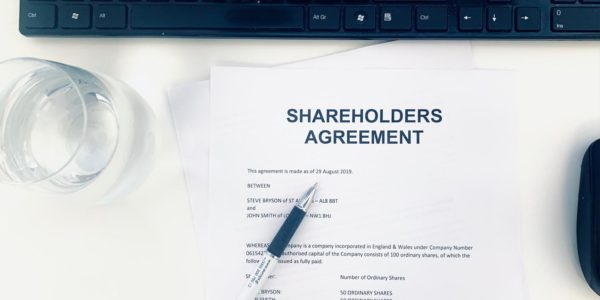A company may decide to issue extra shares, free of charge, to existing shareholders in the same proportion as their existing holding. This is known as a bonus issue of shares. It is also sometimes called a ‘scrip issue’ or ‘capitalisation issue’, because part of the company’s undistributed reserves or profits are capitalised and used to pay up the issue of the shares.
A bonus issue can be in respect of all shareholders or restricted to those holding a certain class of shares.
Key takeaways
- Companies can issue bonus shares as a cost-effective alternative to cash dividends, preserving cash flow for future use.
- Bonus issues distribute existing profits to shareholders without creating new capital, unlike rights issues that require shareholder payment.
- Issuing bonus shares involves a formal process, including obtaining an ordinary resolution and registering the allotment with Companies House.
Examples of a bonus issue:
- A company may decide to issue two free preference shares for every ordinary share held by shareholders.
- A 3 for 2 bonus issue would entitle each shareholder to an extra ordinary share in respect of every two shares they own.
What are the reasons for undertaking a bonus issue of shares
There are various reasons why a company may decide to issue bonus shares:
- Alternative to paying a dividend – rather than paying out cash dividends to shareholders, a company can instead issue bonus shares. The proportions need to remain the same.
- Any Share Premium Account or Revaluation Reserve in the company’s balance sheet can be used to fund a bonus issue without reducing the company’s distributable reserves – which would not be the case with a dividend.
- Excess profits – if these need to be retained for future use, as opposed to distributing them as cash dividends, a bonus issue can ensure that the position of the balance sheet is correctly reflected.
- Trading – since the total number of shares increases, this can encourage active trading.
- Rights issue – although bonus issues are distinct from rights issues (see below) sometimes these are issued in conjunction, e.g., as a method of increasing the holding of shareholders unable to take advantage of a rights issue.
- Registering as a public company – a bonus issue may be used to increase the total share capital of a private company to £50,000, in order to make it eligible for re-registering as a public company.
What is the difference between a bonus issue and an ordinary allotment?
Although the process of issuing ordinary shares is broadly similar to that of a bonus issue of shares, there are some important differences which should be noted.
What is an ordinary allotment of shares?
An ordinary allotment of shares is where a limited company issues new shares following initial company formation. These shares may subsequently be sold or given to existing or new shareholders, to raise additional capital from investors, repay borrowings, fund new projects or reward employees, etc. There are various types of shares which can be created in an ordinary allotment (including ordinary shares or preferential shares, etc).
How is an ordinary allotment different from a bonus issue of shares?
An ordinary allotment of shares is distinct from a bonus issue; whilst shares created by an ordinary allotment can be either sold or given away to both existing shareholders or new shareholders, shares created by a bonus issue can only be distributed to existing shareholders and must be done free of charge. However, as with an ordinary allotment, the types of shares created under a bonus issue can be different. e.g., ordinary, preferential, etc.
What is the difference between a bonus issue and rights issue?
A bonus issue and a rights issue of shares are sometimes confused with each other, so it’s important to make the distinction.
What is a rights issue?
A rights issue is an issue of new shares by a limited company, which are subsequently offered for purchase by existing shareholders in proportion to their current holdings. This offer is generally for a stipulated period of time and at a reduced cost, i.e., to what the shares would otherwise be worth.
A rights issue increases the subscribed share capital of a company and raises new capital. However, since the total number of shares is increased, this tends to have a dilution effect on the value of the shares.
How is a rights issue different from a bonus issue?
Bonus issues of shares stem from accumulated profits and reserves. In effect, excess profits are converted into shares and are distributed to existing shareholders free of charge. This is markedly different from rights issues, where new shares are created (irrespective of profits or reserves) and offered to existing shareholders at a cost.
Other differences include:
- Rights shares can be fully or partly paid up – whereas bonus shares are always fully paid up.
- Rights issues can be renounced – but this cannot be done with bonus shares.
- Rights issues can result in new shareholders, i.e., if existing shareholders renounce their rights – whereas bonus issues cannot bring in new shareholders.
What is a scrip dividend?
A scrip dividend is essentially the same as a scrip issue (which is simply another name for a bonus issue). However, this term it is normally used in relation to public companies.
Public companies often provide shareholders with an option of either receiving a cash dividend or increasing their shareholding by taking a scrip dividend. A scrip dividend essentially converts retained profits into new shares and distributes these shares to shareholders, in proportion to their existing holdings, in lieu of a cash dividend payment.
Bonus packages
It’s important not to confuse the term “bonus shares” (connected to a bonus issue of shares) with employee bonus packages which may involve being given a number of company shares in lieu of (or in addition to) a cash bonus.
Tax issues
There are no tax advantages associated with scrip dividends compared to cash dividends; they are both treated as taxable income in exactly the same way. The cash value of shares received as part of a bonus issue needs to be declared and taxed under the dividend taxation rules.
Tax must be paid in respect of any dividend payments above the dividend allowance (currently £500). The tax paid in respect of dividends above this allowance depends on the income tax band: 8.75% for the basic rate, 33.75% for the higher rate, and 39.35% for the additional rate. GOV.UK provides official guidance on tax on dividends.
If shares received as part of a bonus issue are subsequently sold, Capital Gains Tax may be due. For information on Capital Gains issues in relation to bonus issues, see GOV.UK – capital gains manual.
Treasury shares
Private companies have recently joined listed companies in being able to not only buy back shares but also hold these shares in ‘treasury’. Treasury shares can be held by a company (instead of cancelling them) – during which time there is no change to the amount of the company’s share capital and no amount is transferred to the capital redemption reserve, and sold on or transferred at a later date.
While shares are held in treasury, any associated voting rights are suspended, and they are treated as if they had been cancelled for most tax purposes.
- Redesignation – a guide to converting your company shares
- Pre-emption rights – the key to maintaining your shareholdings
If a company has treasury shares and then undertakes a bonus issue of shares, it can decide whether or not to issue bonus shares in respect of the treasury shares, as well as to the other relevant shareholders. If it chooses to issue bonus shares in respect of treasury shares, these bonus shares are then also held in treasury and are similarly devoid of voting rights while they are held in treasury.
For most tax purposes, these bonus shares held in treasury are treated as though they had never been issued.
What is the procedure for a bonus issue of shares?
- Check the company’s articles of association and shareholder’s agreement to confirm if company directors are authorised to make a bonus issue of shares – and if any specific procedure has been stipulated (in case it differs from Model Article 36 – see below). These documents should also be checked for any pre-emption rights or other restrictions.
- Ordinary resolution – Model Article 36 regarding “authority to capitalise” requires directors to seek an ordinary resolution to gain authorisation for making a bonus issue of shares:
“Subject to the articles, the directors may, if they are so authorised by an ordinary resolution –
(a) decide to capitalise any profits of the company (whether or not they are available for distribution) which are not required for paying a preferential dividend, or any sum standing to the credit of the company’s share premium account or capital redemption reserve; and
(b) appropriate any sum which they so decide to capitalise (a “capitalised sum”) to the persons who would have been entitled to it if it were distributed by way of dividend (the “persons entitled”) and in the same proportions.”
- Board minutes should be taken to record the ordinary resolution, including details of the allotment of shares.
- The company should register the allotment of shares in the Register of Members and the Register of Allotments within two months of the allotment of bonus shares taking place.
- Share certificates should be issued within two months of allotting the bonus shares.
- Form SH01 (Return of Allotment of Shares) should be filled in and submitted to Companies House within one month of the share allotment.
Need assistance with a Bonus Issue?
Our Company Secretarial Team offers a complete Bonus Issue of Shares Service from just £95.00 +VAT.
We’ll guide you through the entire process, providing you with all the supporting documentation you need to make a bonus issue happen, including your board minutes, members resolution, and Companies House forms. Call our experts today on 020 3984 5389 or email us on [email protected] to find out more.
Note: We recommend seeking independent legal and/or accounting advice when undertaking a bonus issue of shares – as there may be various unforeseen tax or legal implications for your business.














Join The Discussion